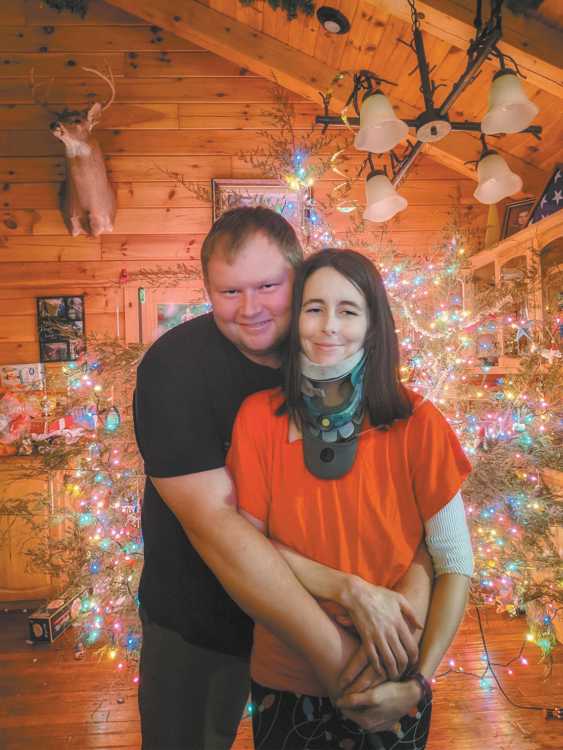Summer Fogle: Living with Ehlers-Danlos syndrome

Editor's Note: This is the first installment in a two-part series.
“What is Christmas really about these days?” Summer Fogle asked in a recent interview. “Do we all celebrate as a family surrounded by all the sights, smells, and sounds of Christmas with everything picture perfect like in the books that tell you how to plan the 'Best Christmas Ever?'"
We first introduced Summer Fogle in the Fall of 2016, shortly after she was diagnosed with Ehlers-Danlos Syndrome.
“We can get so wrapped up in the busy holiday season and the shopping for gifts - making sure we find that perfect gift for everyone on our list - that we often forget the true meaning of why we celebrate Christmas,” she said. “At the very heart of Christmas are the things we all need more of … LOVE and HOPE.”
Ehlers-Danlos syndrome is a genetic connective tissue disorder that causes defects in the body’s collagen.
“Most people just say EDS because it’s too long and you tell a doctor and they look at you like ‘What’s that?’” Fogle said in a 2016 interview at her family’s home.
Although propped up by pillows on either side, with a heating pad on her shoulders, and breathing oxygen through a nasal cannula, she had spoken lively about her diagnosis and explaining how EDS had changed not only her life, but her family’s as well.
“Collagen is the most abundant protein in the body. It provides the basis for strong connective tissues and healthy skin, and is a building block for all the body’s systems,” Fogle said. “Collagen acts as the ‘glue’ that holds your body together.”
Fogle has hypermobility, the most common form of Ehlers-Danlos syndrome, or EDS as she referred to it. There are several types: Classical, hypermobility, Vascular, Kyphoscoliosis, Arthrochalasia, and Dermatosparaxis.
“And this is often the time of the year we need those things the most as Christmas and the holidays, in general, can be very painful and emotional for many who are celebrating from a hospital bed or even from their own beds at home as they may be bedridden due to chronic pain and illness,” she said. “And those that are chronically ill with rare and complex disorders may be traveling far from home for medical issues instead of enjoying being home with their own family, doing their special traditions and enjoying it. Please remember that if you are blessed to be with your family, at home, surrounded by the sights and sounds and smells of Christmas, then you are incredibly lucky and do not take that for granted.”
One of the challenges that the Fogle family faces is having to travel in order to receive the specialized care that they need.
“Our family knows this all too well as we have had to spend birthdays and other special occasions or holidays in a hotel halfway across the country or a hospital during Christmas as we did last year,” she said. “After having to miss Christmas last year, being ‘home for the holidays’ takes on a whole new meaning. And not all Christmas miracles and New year’s wishes look the same. Many are just praying for a Christmas miracle for one of the many conditions coinciding with EDS. And yet others are asking for New year’s wishes to be made in time to get a life-changing surgery to ring in the New Year. ”
The toll a chronic illness inflects is not limited to a patient, but affects their caregivers, their family, even their friends.
“Caregivers of chronically ill pour their heart and soul into doing everything in their power to get their children the very best healthcare and very best team of specialists and surgeons possible,” Fogle explained. “But speaking as both a patient and a caregiver, I can tell you that when your child is hurting or in the hospital, you will do everything you can to comfort them. The spouses that are also caregivers as well as the nurses, doctors, and surgeons all fight and advocate for their patients, spouses, and children so that they get the very best care for EDS.”
Fogle continued, “Ehlers- Danlos Syndrome or EDS is so rare and complex and can affect every single system in the body, and there are no two cases alike. It can range from causing mild to life-threatening health issues that are lifelong and progressive. EDS doesn’t care how old you are, what your plans are or what goals and dreams you may have had. It can start to show it’s cruel and grueling symptoms and chronic pain gradually over many years or very suddenly in anyone at any age. It is a genetic connective tissue disorder that is inherited and a parent that has EDS has a 50 percent chance of passing it on to their children.
Many EDS patients quickly take on the role of being a caregiver to their children as the serious, life-threatening issues that EDS causes in the neck, spine and brain require immediate intervention. So, it is not uncommon to have an entire family be affected by EDS, where all of the children have this condition, just to varying degrees of severity.”
Before her diagnosis with EDS, Fogle and her family had all lived what might be considered a very normal life.
